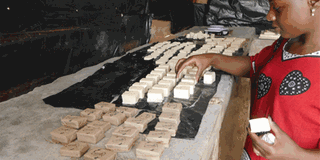Nip malaria in the bud with mosquito repellant soap

A woman arranges samples of mosquito repellant soap from a production line. it is made out of different flavours ranging from palm oil, coconut oil and shea butter among others. COURTESY pHOTO
What you need to know:
Determined to create an intervention for malaria, Ms Joan Nalubega has innovated mosquito repellant soap under the brand name Uganics, Dorothy Nakaweesi writes.
Between dusk and dawn, red puffy bumps of mosquito bites are a common sight. These bites from pesky mosquitoes have continued terrorising Ugandans, accounting for the largest number of deaths.
Malaria is now the number one killer disease in Uganda. The World Health Organisation also estimates that nearly half the world’s population is at risk of malaria.
Yes, this is happening. But how is this being addressed to reduce the dangers?
Besides stocking medical facilities with drugs that treat those affected, government, and Non-Governmental Organisations have also designed rigorous sensitisation campaigns on preventive measures.
Messages encouraging people to sleep in a mosquito net, clearing bushes around them and clearing stagnant water in their environs have become catchwords.
Those who have felt the wrath of malaria are also devising creative and innovative ways in the hope of creating a malaria-free Uganda.
Determined to create an intervention for malaria, Ms Joan Nalubega has innovated mosquito repellant soap under the brand name Uganics.
Soap is an essential part of our lives. Soap is the thing that will clean off all of the dust, sweat, and dirt that we accumulate during the day. It is more important when this soap has ingredients that repel mosquitoes that cause malaria.
The mosquito-repellent soap which lasts up to six hours after use can be used for clothes and linen, plus personal hygiene for the same repelling effect.
Motivation
Sharing her story with Prosper Magazine, Nalubega says this creation was motivated by her ordeal of frequently suffering from malaria while growing up.
“So the experience I had with malaria, inspired me to come up with this creation. Many helpless people are going through the same while others have lost their lives,” Nalubega narrates.
She says it was very sad to see foreigners who come to Uganda have ways of protecting themselves from malaria. Yet locals who are the most vulnerable, had no solution to the disease.
After interactions with several people on how malaria had affected them, Nalubega was inspired to start.
“One of the challenges I found was lack of knowledge and information about malaria itself like how people get it, how they can prevent it, how they can differentiate malaria from typhoid or something else,”Ms Nalubega sa
Primarily, Nalubega started by giving out awareness campaigns messages about malaria in local communities, this she did in partnership with hospitals and also further linked her to institutions like Makerere University plus others in Denmark and Germany.
Through these interactions, Nalubega acquired knowledge about addressing the challenge. This informed her choice in blending the repellants in the soap.
Why soap? She said: “Because soap is one essential product used by all the families and even those who are poor.
Market
Uganics’ target markets are usually mothers with children below five years in rural communities.
“We also market through hospitals. Currently, we are working with 28 hospitals in three districts of Mpigi, Hoima, and Soroti,” Nalubega shares.
To enable everyone to accesses their products, Uganics makes pricing especially in the local communities affordable unlike in hotels where they charge a premium fee. The profit margin they get from the supplies to hotels is used to discount the rate for mothers.
Right now, they have five hotels on board, one hotel in the central and another called Bamboo Sea Resort in Mukono, and the rest in Mbarara.
Capacity
Uganics which officially started production 18 months ago has seen its capacity swell to 30,000 bars of soap monthly from the 5,000 bars they were producing a year ago.
A certificate from the National Drug Authority has boosted their market. The firm is now working towards getting a Uganda National Bureau of Standards (UNBS) quality mark to reach supermarket shelves and shops.
The company’s capital investment is about $27,000 (Shs99m) with an annual Shs7 million profit. Nalubega says they have been reinvesting most of what they make to grow the business.
Challenges
Nalubega says that her business challenge has been the mistrust from some local customers who don’t believe that products locally made can be actually better than imported products.
“So it is really hard for people to trust the products unless they like it and then we cannot continuously give samples to people to first test our products,” She shares.
Another challenge is reliability, especially when they hire people to set up the machines they tend to take time and this delays their production.




